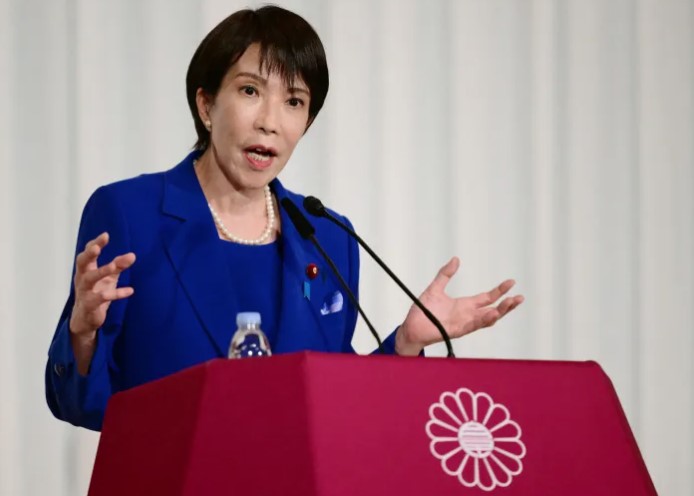Japan’s ruling Liberal Democratic Party (LDP) elected Sanae Takaichi as its first woman president earlier this month. Many expected her to become Japan’s first female prime minister. Her win marked a historic moment. However, China expressed skepticism about her ability to lead.
Rising Doubts Over Sanae Takaichi’s Leadership
Chinese media described Japan as “at a crossroads,” questioning whether Sanae Takaichi could form a stable government due to her hardline conservative views. Experts cited three main concerns. First, her remarks on Japan’s wartime actions, including visits to the Yasukuni Shrine, are seen as provocative and dismissive of past aggression.
Second, her confrontational stance toward China, including a visit to Taiwan and support for peace and stability in the Taiwan Strait, has raised red flags in Beijing.
LDP elects Sanae Takaichi as first female leader in Japan marking major shift in party history
Third, her push to revise Article 9 of Japan’s constitution and rename the Self-Defense Forces could disrupt East Asia’s security balance.
Chinese analysts also criticized Sanae Takaichi’s domestic policies, calling them regressive. Her opposition to same-sex marriage, female imperial succession, and immigration reforms, along with efforts to reduce Japan’s dependence on China for key materials, are seen as politically motivated. Many argue that despite being Japan’s first female LDP leader, her policies lack inclusivity.
Collapse of Japan’s Ruling Coalition
Just days after her LDP victory, Sanae Takaichi’s path to becoming Japan’s prime minister has become uncertain. The Komeito Party, the LDP’s coalition partner since 1999, unexpectedly withdrew its support, creating a political setback that some Japanese conservatives are now blaming on China. The withdrawal has turned the expected smooth transition into a leadership crisis.
Haruo Kitamura is a conservative member of Japan’s House of Representatives. He said China influenced Komeito’s decision. He added that the move aimed to block Sanae Takaichi from taking office. In response, Komeito leader Tetsuo Saito denied any Chinese involvement, stating that his October 6 meeting with China’s ambassador was routine and planned well in advance. He explained that, as party leader, he regularly meets ambassadors from more than 30 countries.
3 Asian Giants Japan, China and South Korea Unite Against US Tariffs, Pursue Bold Free Trade Pact
Asahi Shimbun reported that the real reason behind Komeito’s withdrawal lies in long-standing disagreements with the LDP over political funding, corruption, and transparency issues. The two parties had been drifting apart for months on ethical concerns, though some conservative lawmakers continue to suggest China played a role in influencing the split.
The end of the 26-year LDP-Komeito alliance leaves Sanae Takaichi without a clear majority in Japan’s parliament. Before the split, the coalition held 220 of 465 seats, just 13 short of a majority. Without Komeito’s 24 seats, the LDP must now seek support from other parties to secure enough votes for Sanae Takaichi to become prime minister.
This unexpected political development highlights the challenges Sanae Takaichi faces in consolidating power. What began as a historic moment for Japan’s first female LDP leader now requires careful negotiation and coalition-building amid internal party tensions and external speculation about foreign influence.
Political Uncertainty Deepens as Sanae Takaichi Faces Internal Opposition
The political turmoil has thrown Japan’s leadership into confusion. China’s state-run China Daily described the breakdown of the LDP-Komeito partnership as “a serious blow” to the ruling party. The paper quoted a Japanese political scientist who said the collapse was inevitable because of growing differences in ideology—especially the LDP’s increasing conservatism.
Senior LDP member Funada Hajime described Komeito’s withdrawal as “a bolt from the blue.” He suggested two possible paths to stabilize the situation: either outgoing Prime Minister Shigeru Ishiba could withdraw his resignation and temporarily continue in office, or Sanae Takaichi could step down and seek re-election as party leader to rebuild support.
Japan China and South Korea Agree to Co-operate Amid Changing US Allies
Meanwhile, experts in China have dismissed claims that Beijing played any role in the internal crisis of Japan’s ruling party. Professor Da Zhigang, a well-known researcher on Japanese affairs, said the anti-China accusations are merely political tactics used by rival groups within Japan. According to him, the ongoing “China factor” in Japanese politics reflects deep divisions among domestic political forces rather than actual foreign interference.
As the situation unfolds, what began as a historic moment for Japanese politics has turned into one of its most complex leadership struggles in recent years. Sanae Takaichi’s path to becoming Japan’s first female prime minister now faces strong resistance—not just from her opponents at home, but also from the shadow of suspicion involving China’s influence on Japan’s political landscape.

